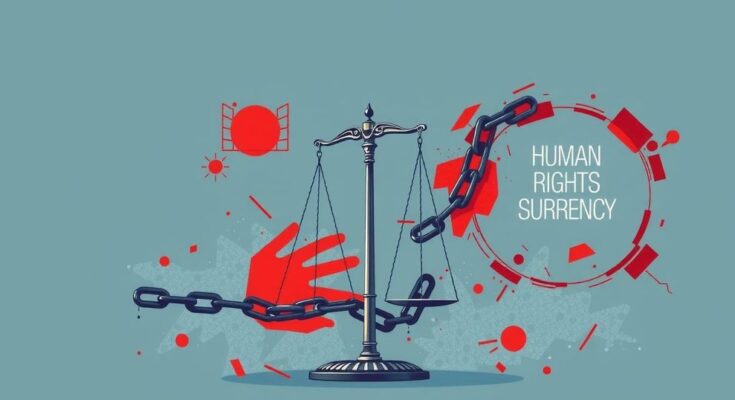Qatar is under the global spotlight due to significant human rights violations, encompassing labour rights abuses, curbs on free expression, and numerous restrictions affecting women. As the UN’s Universal Periodic Review approaches in April, Qatar has received 317 critical recommendations focusing on these pervasive issues. An overview of these concerns highlights the plight of migrant workers who often work under exploitative conditions, the limitations on freedom of speech, electoral reforms, the ongoing struggle for women’s rights, and the situation of stateless individuals known as Bidoon.
Migrant workers, who make up over 90% of Qatar’s population, are particularly vulnerable. Amnesty International’s 2024 report revealed shocking exploitation, with many facing illegal recruitment fees and withheld wages. Workers protesting for fair compensation during the 2022 FIFA World Cup were denied the right to form unions, reinforcing their exploitation. The review warns of a proposed reinstatement of the exit permit requirements, further jeopardising their rights.
Freedom of expression is critically curtailed in Qatar, with individuals facing arbitrary detention for voicing dissent. Reports from Amnesty International denounce laws that severely limit speech and peaceful assembly, particularly targeting those protesting electoral rights for the al-Marri tribe. The codification of restrictive laws in 2020 marks a stark deviation from Qatar’s earlier commitments to uphold international human rights standards.
Moreover, following a single electoral cycle, Qatar’s Shura Council reverted to an entirely appointed system, effectively sidelining public election participation. This amendment was sanctioned through a referendum, indicating a troubling consolidation of power.
Women in Qatar remain subject to discriminatory laws, necessitating male guardians’ permission to seek education, travel, or receive healthcare. Both Amnesty International and Human Rights Watch reports highlight the persistent mobility restrictions and systemic subjugation women face within the guardianship system.
In a chilling case, Australian women have resumed legal actions against Qatar Airways after allegations of physical violations during their flights, ignited by a disturbing incident at Hamad International Airport in 2020. While the initial court ruling was unfavourable, hope for justice persists under international treaties.
Compounding these issues, stateless families from the Ghufran clan have endured human rights violations since being stripped of citizenship in 1996, resulting in loss of basic rights. Climate factors further exacerbate migrant workers’ conditions, as Qatar’s extreme heat poses serious health risks despite recent protective measures.
As Qatar prepares for its next UN review, a commitment to human rights remains in question. Qatar has accepted a portion of the 317 recommendations, including pledges to enhance protections for migrants and ensure freedom of expression. However, the actual implementation of these promises will be paramount in determining whether progress is genuine or a façade.
Qatar is facing intense international scrutiny for its human rights violations, receiving 317 recommendations from the UN’s Universal Periodic Review. Concerns focus on the mistreatment of migrant workers, restrictions on freedom of expression, the rollback of electoral rights, and pervasive discrimination against women. A commitment to implementing recommended reforms remains to be seen as Qatar prepares for further evaluation by the UN.
In summary, Qatar is facing formidable scrutiny regarding its human rights record leading up to the upcoming UN Universal Periodic Review. Key issues include rampant violations of migrant workers’ rights, limitations on freedom of expression, electoral processes reverting to appointive systems, and systemic discrimination against women. While Qatar has acknowledged some of the comprehensive international recommendations, real change will require earnest implementation. As global attention intensifies, the fate of human rights in Qatar hangs in a precarious balance.
Original Source: www.aa.com.tr



